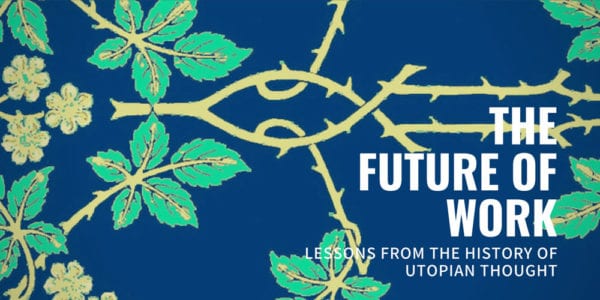Beyond 5%: why autonomy matters for workers’ wellbeing
A recent trial of 4 day week in New Zealand inspired a 5% increase in life satisfaction. As celebrated as the results are, such measures are unlikely to contribute sufficiently towards more sustainable economies, Simon Mair argues, reflecting on the limits of such reforms within our current system. He wonders what it might take to get beyond 5% to something more utopian.

A New Zealand company has been making headlines for all the right reasons this week: Perpetual Guardian, who manage wills, trusts and estate plans, has trialled a four day week for its employees. The Guardian declared it “an unmitigated success” reporting that “Reduced hours for same pay increased successful work-life balance management, cutting stress levels and boosting commitment”. Buried further down the story was another statistic that I’d like to unpick: life satisfaction only increased by 5%.
While a 5% increase in life satisfaction is good, it did get me wondering why it wasn’t higher. On twitter I had a brief discussion with David Spencer where I suggested that it might be because a reduction in work time does little to increase autonomy. David (who has published interesting stuff on work in utopia and classical economics) responded that autonomy already looked pretty high at the company involved. Here I just want to briefly elaborate on what I meant, and point to the limitations of change while remaining within a capitalist mode of production.
The context for my interest in this is that I’m currently updating the discussion from our recent working paper on utopian ideas about work. I’m trying to connect the ways that older utopians have considered work with more contemporary discussions. To this end I’m reading The Problem with Work: Feminisim, Marxism, Antiwork Politics, and Postwork Imaginaries by Kathi Weeks, and Inventing the Future: Postcapitalism and a World Without Work by Nick Srnicek and Alex Williams. Both books critique the idea that work is necessary and argue that a shorter working week, coupled with a basic income, can radically shift modern understandings of work.
What Weeks, Srnicek, and Williams see is that acts like reducing the working week are potentially utopian or potentially reformist. And the latter is not sufficient to free us from some of the more damaging restrictions imposed by work in the modern economy.
I think this helps explain why what looks like a radical change – reducing working time by 20% – produces only a relatively small increase in life satisfaction.
Specifically an extra day off actually does relatively little for our autonomy. Yes, it gives us more time that is ours. But it doesn’t free us from the need to work. And it doesn’t give us autonomy at work.
Dependence on the market is a core dynamic of the capitalist economy, and it immediately places workers at the mercy of capitalists. In a market economy, we have to be able to buy the things we need to live. When you spend all day in an office, it becomes challenging to grow your own food. Moreover, in a market economy you have to have money to be able to buy goods. And you have to be able to buy goods before you can work. Consequently, you have to work for someone who already has access to sufficient money to pay you in advance of your actually producing anything. In today’s economy, it is capitalists who have access to such funds and provide them to workers. In exchange for wages, capitalists make demands that restrict our autonomy.
On its own, working less does not change this relationship. Most of us still have to work for someone else in order to survive. This restricts where we live and the structure of our days, weeks and years. And when we’re at work we have to meet the aims of our employer. We see this in the Guardian write-up of the story, which emphasises the ways that reducing working hours fundamentally did not disrupt the nature of the business. One of the key tasks for employees when designing the trial was to ensure that the four day week wouldn’t damage productivity. (Incidentally, this suggests that experiments like this are unlikely to contribute towards more environmentally sustainable economies as output from business will remain the same). Moreover, the aims of our employers are unlikely to completely coincide with our own aims.
This is important because work is one of the major ways that we engage with and contribute to society. Work shapes the world we live in. So restrictions made by our employers necessarily limit the way we are able to shape our world. This is more pronounced in some forms of work than others. But I would venture a guess that even the most progressive company places restrictions on the work its employees do and the ways they do it.
This is why Weeks, Srnicek and Williams all couple a reduction in working hours to a basic income: to give us more autonomy by placing “labour collectively in a stronger position to determine the conditions and nature of work itself”. Only when this happens will reductions in work time get us beyond that 5% increase in life satisfaction, and into a more utopian realm.



